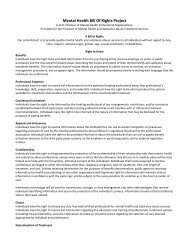2008 Ohio Psychologist - Ohio Psychological Association
2008 Ohio Psychologist - Ohio Psychological Association
2008 Ohio Psychologist - Ohio Psychological Association
Create successful ePaper yourself
Turn your PDF publications into a flip-book with our unique Google optimized e-Paper software.
“It May Be Descartes Fault, But<br />
Why Are We Still Doing It”<br />
The Pitfalls of Biological versus<br />
<strong>Psychological</strong> Explanations for<br />
Mental Illness<br />
By: Craig S. Travis, PhD, Mount Carmel Family<br />
Medicine Residency, and Mary Miller Lewis,<br />
PhD, Senior Life Consultants, Inc.<br />
Abstract<br />
This article explores the danger underlying the opinions of healthcare and<br />
insurance industries that if a condition is physical (biological) it is valid<br />
and real, but if it is psychological (emotional), then it must not be real.<br />
Therefore, for psychological illnesses to receive the same validity, they must<br />
be biologized. Although biologizing mental illness may have some positive<br />
aspects (e.g., validating the existence of a disorder), overall it may actually<br />
have a detrimental effect on the profession of psychology and marginalized<br />
groups. The authors conclude with a call to the profession to examine their<br />
own beliefs about biologizing mental health.<br />
Glennon J. Karr<br />
Attorney at Law<br />
Legal Services for<br />
<strong>Psychological</strong> Practices<br />
(614) 848-3100<br />
Outside the Columbus area,<br />
The Toll Free No. is:<br />
(888) 527-7529<br />
(KARRLAW)<br />
Fax: (614) 848-3160<br />
E-Mail: karrlaw@rrohio.com<br />
1328 Oakview Drive<br />
Columbus, OH 43235<br />
“Is this a biologically based disorder”<br />
Oft heard remark from insurance companies<br />
Healthcare and insurance industries hold the opinion that if a condition<br />
is physical (biological) it is valid and real; however, if it is psychological<br />
(emotional), then it must not be real (e.g., “in your head”). Why does this<br />
happen Perhaps it is because of the stigma of mental illness that has been<br />
pervasive in society throughout time, or maybe it is because concrete, tangible<br />
things are easier to understand. The assumption that something must be seen<br />
to be “real” creates a failure to acknowledge the psychological as legitimate.<br />
Abstract ambiguous constructs are harder to explain, especially when they<br />
rely on subjective human experience, yet they’re probably equally, if not more<br />
important to validate as “real.”<br />
Perhaps the lack of validation of the psychological as real is a possible<br />
explanation for the mass increase of DSM diagnoses that has occurred over the<br />
last 20 years. We need diagnostic labels to help target the problem; however,<br />
there are pitfalls in biologizing mental health disorders that could ultimately<br />
undermine psychologists and psychotherapy as a “valid” treatment for mental<br />
illnesses. This article explores the authors’ belief that we are dangerously<br />
medicalizing and biologizing both psychology and human nature, and how this<br />
subtly has a detrimental effect on the profession of psychology, marginalized<br />
groups, and subsequently on society as a whole.<br />
THE OHIO PSYCHOLOGIST AUGUST <strong>2008</strong> 24











